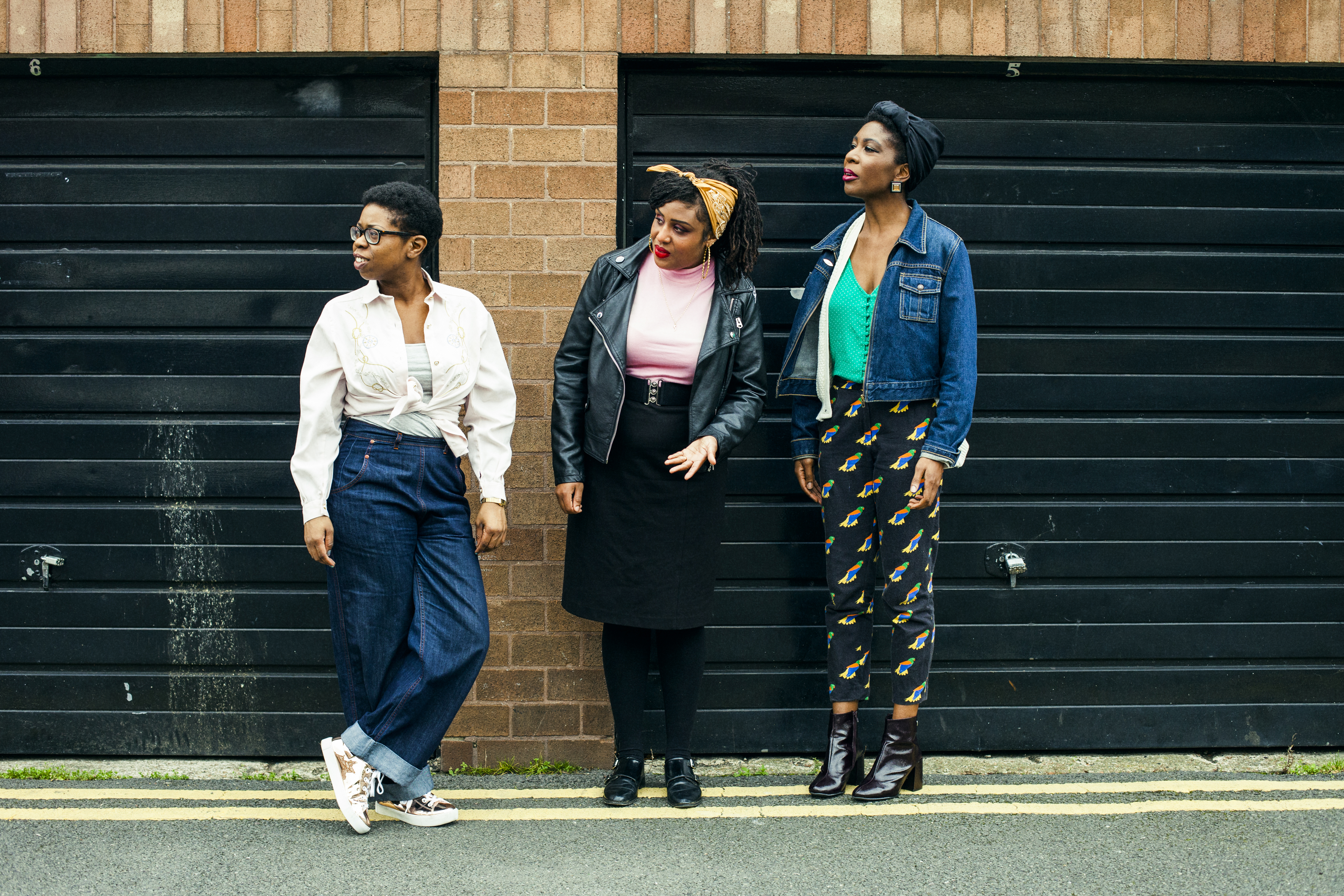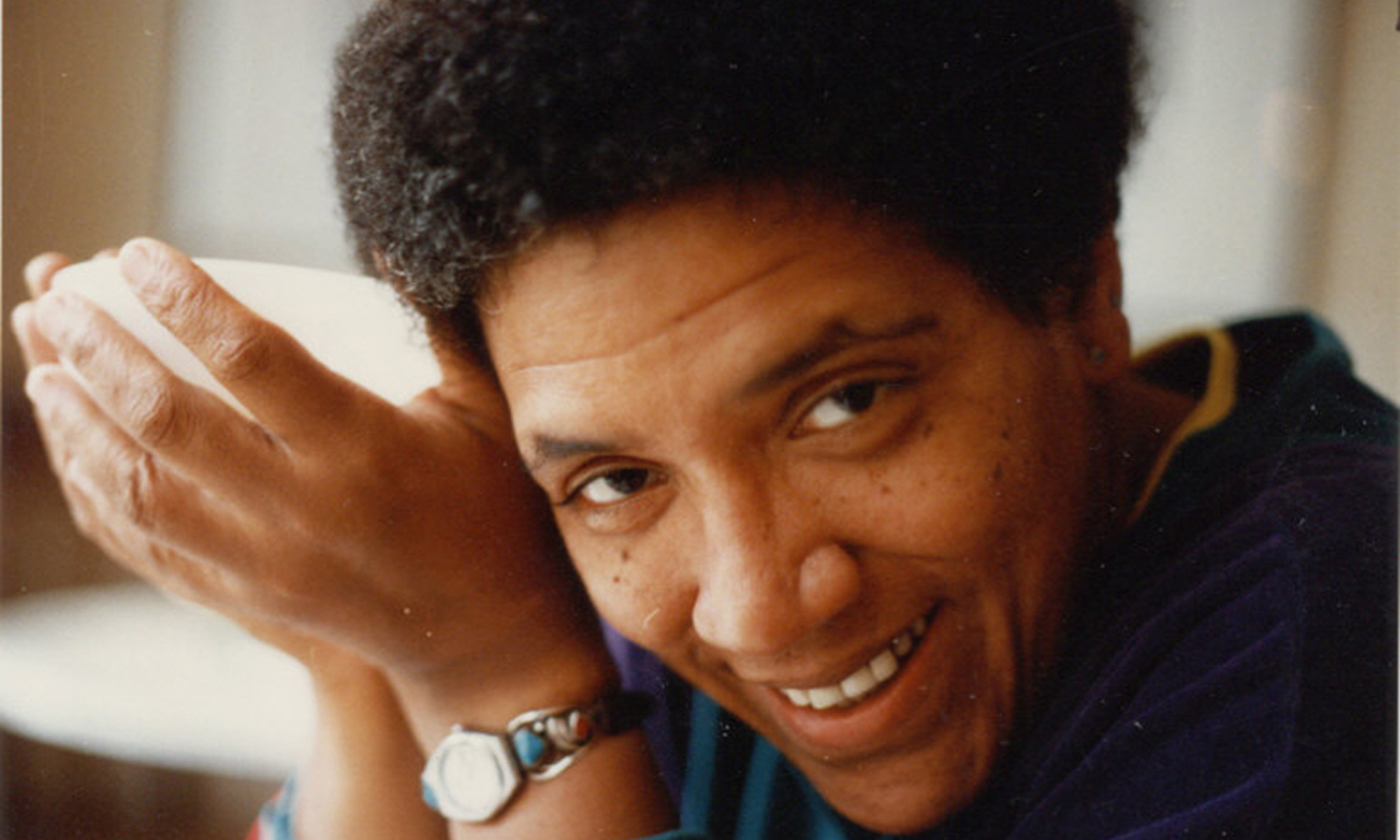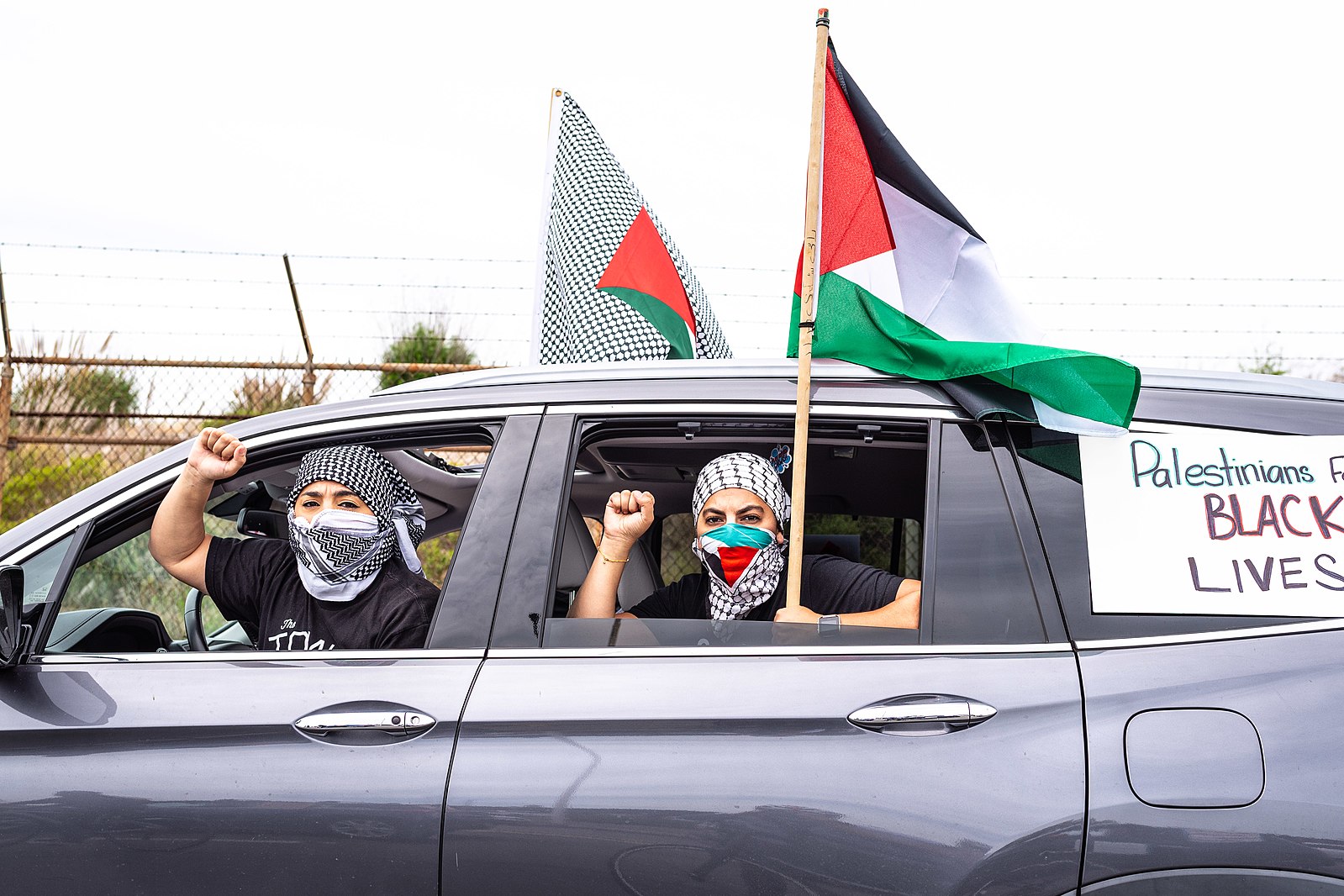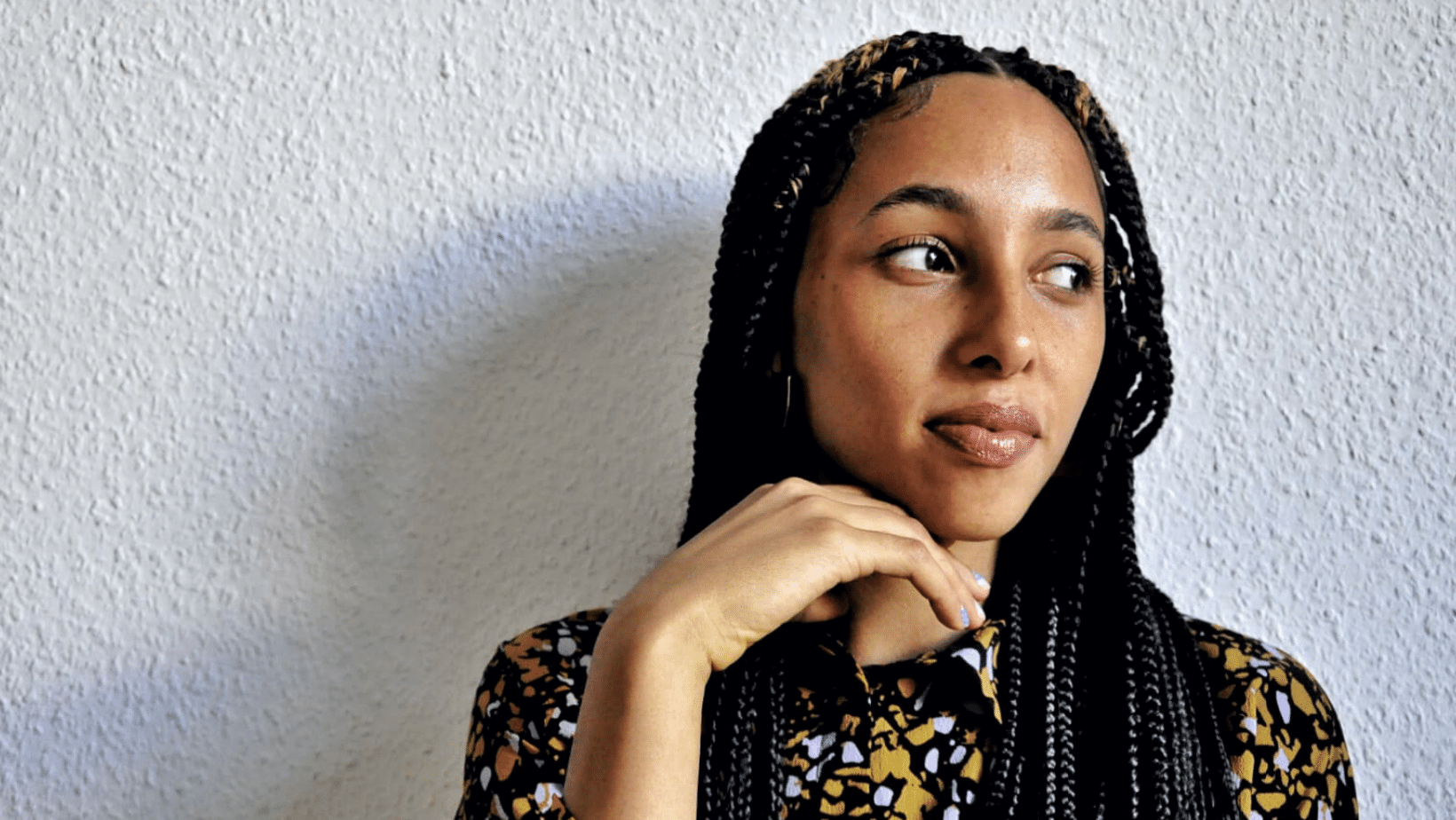
‘What is our generation’s legacy going to be?’: Big Joanie interviewed
Black feminist punk band Big Joanie sat down with Jenessa Williams music, collective activism and using your voice.
Jenessa Williams
12 Dec 2019
Big Joanie photography by Ellie Smith
Every time an election rolls around, it can be pretty telling which bands use their platform, and which choose to stay silent, despite their so-called “activist” status. For Big Joanie, keeping their mouths shut simply isn’t an option. A self-described black feminist punk band, the music they make – and the day jobs they hold while doing so (ranging from legal advocacy and journalism to creating safe community spaces and helping rehouse vulnerable youths) – imbibes their very existence with politics.
Having spent the last year touring relentlessly, crossing paths with the likes of Bikini Kill, the Raincoats, Gossip and more, the skills for delivering their message in powerful terms is ever-increasing, setting them up for their second album in 2020. Put simply, there’s nobody else quite like them, and when “black music” is so often coded in the press as hip-hop or R&B, it’s endlessly refreshing for this former pop-punk emo kid to see a group of black women take up space in the institutionally-white spaces of rock.
In the midst of their UK tour, we caught up with Steph and Chardine from the band to talk life as a self-funding touring band, the importance of voting Labour and how proper social activism should always involve more listening than talking…
gal-dem: A lot has happened since the last time you spoke to gal-dem in late 2016: there’s been an album, a whole lot of touring and you’re working on the next record as well. How the heck are you balancing it all against the day jobs and all of the other things you have got going on?
Steph: I think we’re just tired, to be honest! We’re worn to our very limits, but we’re dedicated. There’s not really a lot of time because obviously, we all work and Chardine is back studying law. Because we’ve been so busy and haven’t had time to focus for very long, the new songs started off quite bitty, but we’re getting there. A lot of them are based around two chords and a similar vocal line – it allows us to get that nice repetitive refrain sampled and super droney, but it’s still basically two chords. I think building on from the album, we’ve got a Micro-Korg now and we’re developing our sound: more synths, more toms, more drums. It’s still the simple Big Joanie set-up just slightly expanded.
How does writing normally work for you? Do you start with lyrics or build up from the sound?
Steph: It’s every which way. We approach it, or think of it, like doing a puzzle. You’ll come up with one bit of an idea and then write it down or save it into a voice memo and then come back to it later to try and piece everything together. If there was a formula for writing a song it’d get really boring – the best thing about writing a song is that you never really know what’s going to happen. You never really know if it’s going to be good in the end or if you’re going to spend all that time making something shit.
It must be quite inspiring with the amount of touring you’ve been doing, the number of people you’ve gotten to play with or meet… have you been offered any particularly helpful advice?
Chardine: I think most of the stuff you learn is from watching people, seeing how they are on stage. From playing with Downtown Boys, we learned about fixing a set and making the whole thing a performance, even during changeovers. Even though we’re in a punk band, when you start playing with some of the bigger acts you see that they really do take it seriously. Things like looking after your body, making sure you warm-up and don’t just go out there and just start screaming. We saw this with Beth Ditto and Gossip – it’s so much more than singing really powerfully for 90 minutes each day, you see how people look after themselves and manage to make sure that their performances are good for their audiences.
Steph, you also work as a music journalist – is it tricky to balance being the artist and the observer?
Steph: To be honest no, I’d have no idea how to describe our music or anything we’ve written. It’s always nice to hear what other journalists think for a valuable outsiders’ view. To me, it makes perfect sense to do both – I love music and I want to understand it. That involves being involved in every part of it: putting on shows, organising festivals and writing because you want to figure it out. It can feel a bit sticky, because the majority of the output in guitar-based genres is made by white artists, and magazines don’t necessarily have the range to cover what they’d like to cover and know that at times they’re tokenising their own journalists too. I don’t know what can be done to tackle that, but I try and make sure I’m covering artists that I’m instinctively drawn to, but also be open to taking on artists that might have a different worldview to me so I can expand my writing. I feel like I’m at the very beginning of my career as a writer as well, so I want to develop myself more and be more than I am currently.
“I love the Smiths, they’re such a fundamental part of my personal musical heritage and their songs still mean so much to me, but Morrissey is a prick…why am I still listening to this when this person hates my existence?”
– Chardine, Big Joanie
You’ve all spoken about how race plays a big factor in the way that fans react when an artist is revealed to be problematic. As a band that’s aligned with a lot of punk ideals around zero tolerance, what is your take on cancel culture and forgiveness?
Chardine: It’s a difficult one. Someone like Morrissey is a good example. I love the Smiths, they’re such a fundamental part of my personal musical heritage and their songs still mean so much to me, but the guy is a prick. It’s a constant relationship that’s now in all music scenes, but it feels particularly strong with Morrissey – why am I still listening to this when this person hates my existence?
Steph: People still stan for Chris Brown, and R Kelly…that documentary is so sad.
Chardine: We used to be fine accepting that there would be some consequence when you did something wrong. A lot of the arguments against cancel culture seems to just be protecting people from the negative consequences of their actions. Are people really asking for people to be cancelled, or just accountable? It’s really not that difficult when someone is writing a piece about Morrisey to also contextualise the racist views he has expressed. Fans can’t really deal with people being complicated. It’s like Brexit – it’s yes or no, ‘maybe’ answers aren’t okay.
Speaking about Brexit and about voting, I’ve seen that you’re very supportive of Labour and were actively encouraging fans to register to vote at your merchdesk. Does that come from a place of love for Labour for Labour’s sake, or simply as a viable alternative to the Tories?
Chardine: It’s a bit of both really. It was Steph’s idea to use the merch table to raise awareness. In general, we’re facing such a right-wing government that we do need to provide an alternative. That’s not to say that all Labour’s policies are perfect, but in general, all the things that they are proposing are policies are beneficial to people like us. I don’t think that could be argued with.
Do you think social media has been helpful in terms of spreading political messages and discussion, or do you think it’s created more problems than it’s worth?
Chardine: I think there was a tipping point around 2013. I met a lot of people online who are still mates, but there was always the space that was offline – a black feminist meeting group was the place that you went, and it feels like that’s now gone. I don’t even know where the black feminist meet-up groups are now that aren’t just panel discussions? Those are about you looking up to someone rather than engaging and being part of the conversation, and it’s often conversation which is truly useful. Meet-up groups remind us that everyone is equal and taught me about the struggles of South Asian women, how they differ and how they are similar to my own. It’s really beneficial to learn about the struggles of other people of colour.
Steph: I guess it’s good in that, if the others had never seen my posts online about wanting band members or been reading my blog, we may never have come together. But because of the way that social media works, a lot of conversation isn’t as natural – someone puts out a statement and people will either agree or refute it. It creates a different dynamic, and the black feminist conversation has become panels where you agree or disagree silently from the audience with what’s being said rather than engaging and developing your own thoughts. It’s a shame, as it doesn’t help activism move into real spaces and beyond a hashtag.
“[With activism] start with developing your understanding of yourself, your communities and getting people together in real spaces. Sometimes just having a meet-up and learning about other people is enough”
– Steph, Big Joanie
I think lots of people feel like they would like to take that activism out into the ‘real world’, but aren’t really sure that they have the power. From your perspective, where do you think is the best place to start in terms of learning how to use your voice?
Steph: The notion of needing to create a platform for something so often comes before you’ve actually developed what it is you want to say in the first place. So what happens is that people with underdeveloped politics end up doing a lot of talking without enough knowledge. Just because you have the confidence to speak, doesn’t mean you’re ready to do so. Sometimes a person who has the least confidence is the right person. Start with developing your understanding of yourself, your communities and getting people together in real spaces. Sometimes just having a meet-up and learning about other people is enough – we don’t really know about our neighbours anymore. We talk about them and acknowledge they’re there, but what can we do to help them? That’s really essential and something I’ve been thinking about for the last year, about how to make that happen and use things like Decolonise Fest [the DIY Punk event that the band are involved in organising] to engage with that.
Chardine: Definitely, consciousness-raising groups were and will always be so essential. If you look historically to the Combahee River Collective, that was a kind of consciousness-raising group that allowed people to find the connections around their experiences. That’s where the activism comes from – a collective, rather than lots and lots of individuals trying to create a voice about an issue. A good modern example would be OWAAD – Organisation of Women of Asian/African Descent: one of their first direct actions was a sit-in at Heathrow Airport in protest of the mistreatment and body searches of women who were coming from Pakistan and Bangladesh.
“I’d like to see more stuff around structural issues, rather than the representational stuff. It’s important that people are out there doing the whole ‘my experience as a black woman’ thing, but you can’t just keep doing those things as an individual”
– Chardine, Big Joanie
I’d like to see more stuff around structural issues, rather than the representational stuff. It’s important that people are out there doing the whole ‘my experience as a black woman’ thing, but you can’t just keep doing those things as an individual. Me talking on a panel about black feminism will maybe make one or two people think about things, but without all the other stuff that I do, it doesn’t mean anything. There’s a lot more going on that just the talking – some of the people I know frighten me with how much them put themselves on the line: the lawyers and activists that are there day in and day out at detention centres, writing letters of advocacy. You never hear about them on social media, they’re not doing it for 50,000 followers. Those are the people doing the work.
Steph: People need to focus on the work rather than the glory because the work will see you through. People will be able to recognise when you’ve made a difference and you’ll know it too – it will mean a lot more than getting a book deal or a viral tweet.
Chardine: It does make you think. Every feminist wave has its legacy. There was the campaign for the right to vote, or things around abortion in the seventies, things that we have structurally in legislation and the law. With this generation, what is our legacy going to be? That’s something we need to think about, because if it’s just a couple of deals for books that will probably go out of print in 10 years time, then there is more we need to do.
Big Joanie play Moth Club, London on 23 January – find tickets here. Follow them on Bandcamp.









